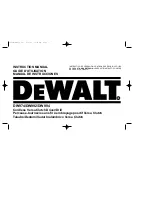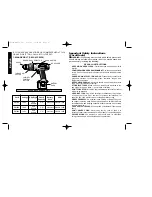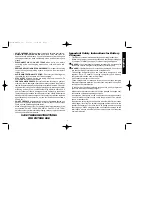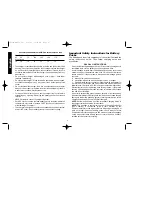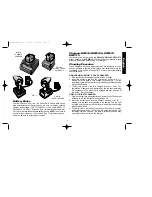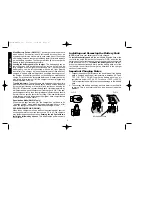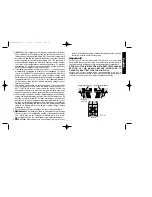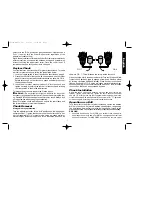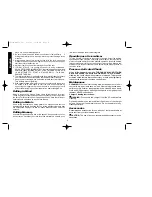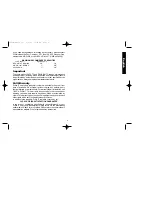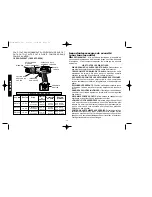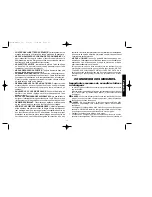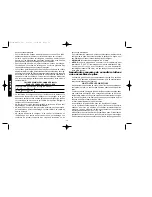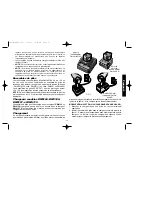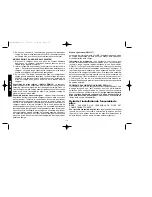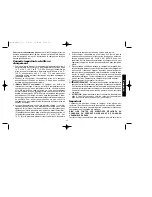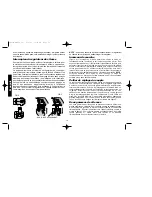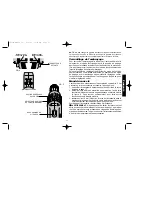
Important Safety Instructions for Battery
Packs
The battery pack is not fully charged out of the carton! First read the
safety instructions below. Then follow charging notes and
procedures.
READ ALL INSTRUCTIONS.
•
Do not incinerate the battery pack even if it is severely damaged or is
completely worn out.The battery pack can explode in a fire.
•
A small leakage of liquid from the battery pack cells may occur under
extreme usage or temperature conditions. This does not indicate a
failure. However, if the outer seal is broken and this leakage gets on
your skin:
a.
Wash quickly with soap and water.
b.
Neutralize with a mild acid such as lemon juice or vinegar.
c.
If battery liquid gets into your eyes, flush them with clean water for
a minimum of 10 minutes and seek immediate medical attention.
(Medical note: The liquid is 25-35% solution of potassium hydroxide.)
•
Never attempt to open the battery pack for any reason. If the plastic
housing of the battery pack breaks or cracks, immediately discontinue
use and do not recharge.
•
Do not carry extra battery packs in aprons, pockets, or tool boxes along
with other metal objects. Battery pack could be short circuited causing
damage to the battery pack and possibly causing severe burns or fire.
•
Charge the battery packs only in D
E
Walt chargers.
•
NOTE: Review and observe all of the “Important Charging Notes” in
the charger instruction section of this manual.
•
NOTE: The batteries in your battery pack are the nickel–cadmium
type. Cadmium is considered to be a toxic material by the
Environmental Protection Agency. Before disposing of damaged or
worn out Nickel–Cadmium battery packs, check with your state
Environmental Protection Agency to find out about special restrictions
on the disposal of these battery packs or return them to a D
E
WALT
certified service center for recycling.
2
Recommended Minimum AWG Size for Extension Cords
Total Extension Cord Length (feet)
25
50
75
100
125
150 175
Wire Gauge
18
18
16
16
14
14
12
•
The charger is ventilated through slots in the top and the bottom of the
housing. Do not place any object on top of charger or place the charger
on a soft surface that might block the ventilation slots and result in
excessive internal heat. Place the charger in a position away from any
heat source.
•
Do not operate charger with damaged cord or plug — have them
replaced immediately.
•
Do not operate charger if it has received a sharp blow, been dropped,
or otherwise damaged in any way; take it to an authorized service
center.
•
Do not disassemble charger; take it to an authorized service center
when service or repair is required. Incorrect reassembly may result in
a risk of electric shock, electrocution or fire.
•
To reduce risk of electric shock, unplug charger from outlet before
attempting any cleaning. Removing the battery pack will not reduce
this risk.
•
NEVER attempt to connect 2 chargers together.
•
DO NOT store or use the tool and battery pack in locations where the
temperature may reach or exceed 105°F (such as outside sheds or
metal buildings in summer).
•
The charger is designed to operate on standard household electrical
power (120 Volts). Do not attempt to use it on any other voltage!
English
385360/DW974 etc 5/2/02 11:25 AM Page 2


